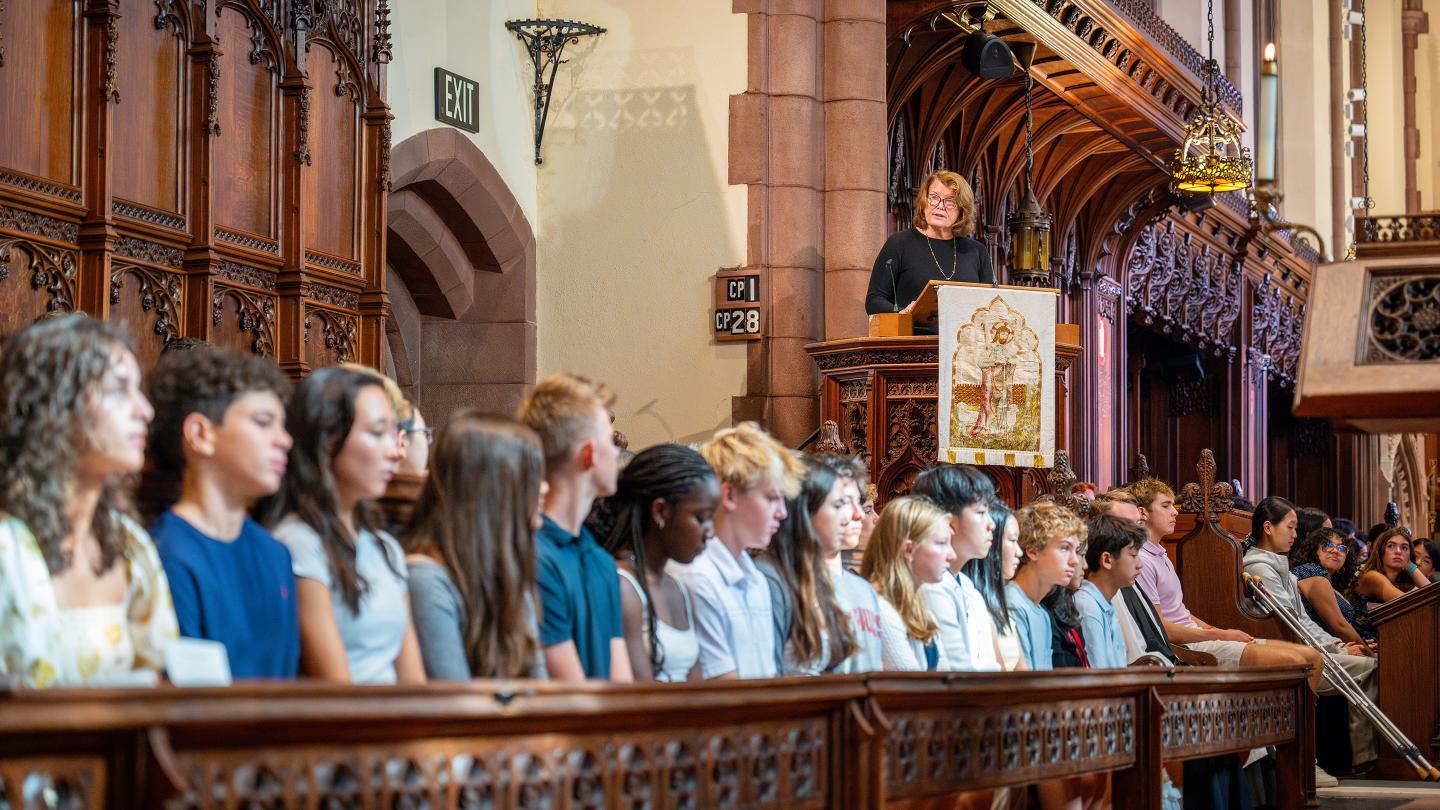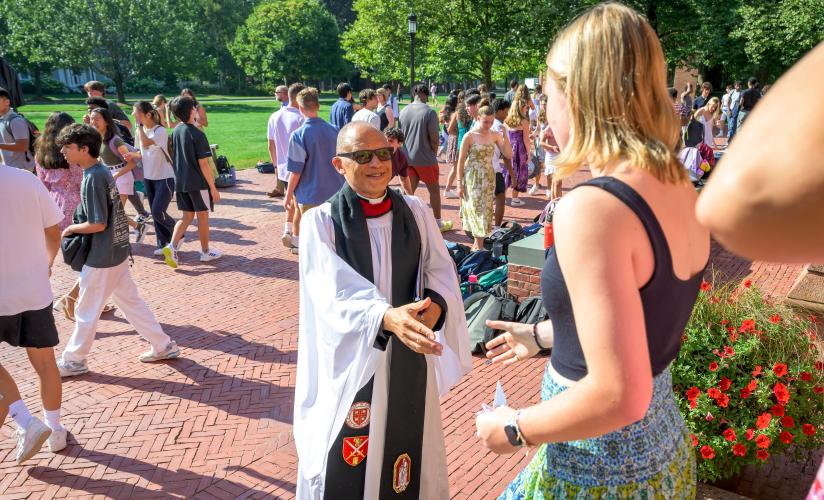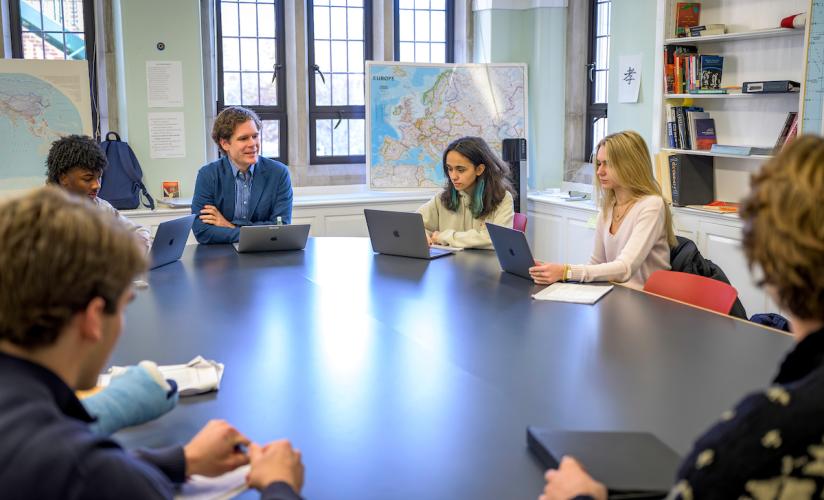

Fourteenth Rector Kathy Giles opens the 170th academic year with remarks about how being a person of good character is a prerequisite for school — and life.
Good morning, and happy new year! Special welcome to our new faculty members and new students, new to this chapel and to chapel as we know it.
So, what’s our good news on the fall? Here’s the beginning —
- Ms. Blosser got married over the summer!
- Welcome back to Ms. Cepiel from her year-long sabbatical and to Mr. Bozak from his sabbatical last spring;
- Best wishes to Dr. Morse (year-long sabbatical).
- Congratulations to Ms. Vicinanzo and her husband, who welcomed baby Eliana to their family, and Ms. Vicinanzo will be on maternity leave this fall;
- Ms. Bernier is also on maternity leave this fall, with baby Charlie;
- Congratulations to new faculty member Mr. Makianich and his wife, who welcomed baby Elena over the summer.
Please join me in welcoming our new faculty members to the community:
- Mr. Anderson in Science
- Ms. Berry-Toon in the Dean of Students Office
- Dr. Bonmati in Spanish
- Dr. Canniff in Science
- Mr. Fite in Humanities
- Mr. Garber in Science
- Ms. Groll in Science
- Rev. Jones in Humanities and the Chaplaincy
- Ms. Magnus in Arts
- Mr. Makianich in Arts
- Dr. Mohler in German
- Ms. O’Connor in Theater
- Ms. Phillips in Science
- Mr. Pierre in Humanities
And, of course, we welcome again all our new students, who began their time in this community over the past few days and are already changing us for the good. We hope that you feel, already, that you are among friends.
Much has happened this summer. For the past 69 years, we have welcomed New Hampshire high school students for the Advanced Studies Program; they live here and attend classes for five weeks, from the end of June to the end of July — then the work on our campus truly begins. There are new bathrooms in the Coit houses, some Schoolhouse construction that will soon be finished, and some wonderful improvements in the Athletic and Fitness Center, to name a few ways that our colleagues in Facilities have been working hard to make your time here better and more comfortable. We could not do this without them! We pride ourselves as a community on greeting each other and on saying thank you, and please, when you greet a member of our Facilities team in the dorm or visit an office to get help with your schedule or a leave, when you see a staff member on a on a path or a FLIK colleague in the dining hall, please remember to greet them. A little thanks goes a long way, and a “hello” can make someone’s day. Let’s be a great place not only to live and learn, but also, for good people to feel great about coming to work, every day, to support your learning. It is a huge effort to launch a great school year. Gratitude is one of the best habits of happy people, and as we know, we have so much for which to be grateful, every day.
I know that you have had a lot of meetings going over how we hope this year will take shape, with the new cell phone policies and simplified grading policies at the top of those lists. We know that the School’s rules are the givens and the starting points, not our goals — the rules are the guard rails for community life here that protect the bases for expectations and trust. They also provide the guard rails for our actions and the way our actions represent our character. In the School’s mission statement, we say that we are dedicated to the pursuit of excellence in character and scholarship — and character comes first. Character can be defined in many ways, such as “the inner nature of a person reflected by their outward actions,” and being a person of good character or good moral character is actually legal prerequisite for everything from most jobs (yes, it is actually part of most job descriptions!) to applications for citizenship. Whether there are rules or laws or norms, being a person of good character is a prerequisite for being a person who can be trusted. So much of what is happening in our world right now seems to discount and challenge good character, from political partisanship and hateful behavior to AI-generated deep fakes and the misinformation of so-called alternative facts to all the ways that social media is irresistible but constantly tempts us to react out of line with our values. As we open the school year, I want to share an idea from a talk I heard this summer on the question of good character in hopes that you will find it worth your consideration in quiet moments over the coming days and weeks.
The talk was given during the Advanced Studies Program by Clay Splawn, who teaches Biomedical Ethics during the ASP and science during the school year at the Berkshire School in Massachusetts. He brought up a thought experiment that he found in Book 2 of Plato’s “Republic,” one of the most influential, non-religious books ever written about the philosophy of justice. This story is known as the Ring of Gyges, and in the “Republic,” it is told by Plato’s brother, Glaucon. According to the story, Gyges, a young shepherd in the service of the King of Lydia, was out tending his flock one day when a great storm occurred and a subsequent earthquake opened a crevice into the ground. Gyges descended into the crevice where he found, among other things, a bronze horse with doors. Opening the doors, Gyges saw a human skeletal form possessing a golden ring. Gyges took the ring and ascended from the opening. Later in the month at a gathering of the shepherds of the King, Gyges noticed that when he twisted the ring on his finger, he disappeared. Those around him began speaking of him as if he weren’t there. He used this trick over and over, and it worked each time. Now, having acquired this ability to become invisible, Gyges arranged to become a messenger sent to the king’s court. Once in court, Gyges used his magic ring to gain the graces of the queen, whom he seduces. With the power to go undetected, anonymous and invisible, he then managed to conspire with the queen to kill the king and to take over the kingdom.
Was Gyges wrong in using the power of invisibility to get his own way? Any man with a similar power, Glaucon summarizes, would do the same: people are only good because we are afraid of the consequences of bad actions. If we could get away with crimes that advance our interest, we would all do so. The implication of the story is that being just or morally good is not fundamentally in our interest. It is something we do as a compromise because we are afraid of consequences and punishment. In short, Plato’s brother argues, no one is good or acts justly for intrinsic reasons.1 We are only good because of rules and punishments.
The debate that surrounds this story is fascinating in the many versions that have followed throughout the centuries. Many of us might be very familiar with the Rings of Power in J.R.R. Tolkien’s “The Lord of the Rings” stories, particularly with the challenges Frodo faces when the power that comes with invisibility calls strongly to him and threatens to change him forever, before he lets it go. Frodo has seen how the ring — symbol of the power of invisibility, anonymity, ability to act without justification or consequence — corrupts, and even then, the power of invisibility almost overwhelmed him. Perhaps a gentler version can be found in the Cloak of Invisibility in Harry Potter’s world, handed down from generation to generation of students at Hogwarts. Who hasn’t wanted to be invisible, for a broad variety of reasons? And yet, as we Hogwarts fans know, the Cloak of Invisibility only hid what people could see; it did not prevent one’s identity from being tracked by those with different ways and means of seeing. It did not prevent Harry’s presence from being found out.
So, this past summer, when Mr. Splawn told us this story, in this chapel, he then asked us to imagine that we had each come into possession of such a ring or a cloak — what would be the first thing we would do with this power of invisibility? After a moment, Mr. Splawn offered his punch line: “With such a cloak of invisibility — complete and utter freedom to do what you want and when you want, with absolutely zero chance of getting caught — what immediately pops into most of our minds is to do what we don’t normally get away with. With such a power, our honesty and integrity seem to break down.”2 Ultimately, Mr. Splawn believes otherwise — but the question is real.
What do you think? Is it human nature only to do the right thing when we are compelled to do so? Or, when we get to choose, would we choose to do the right thing, even if it seems to be against our own self-interest? What a great question for the opening of this school year! Mr. Splawn continued, “invisibility tells us something about ourselves. And this is a really critical insight. Our character — our true character — is really only knowable when we are ‘invisible,’ when all external constraints, all external carrots and sticks, all fears about repercussions, all hopes of external recognition, when they are taken away. In those circumstances when we are invisible, we learn about ourselves in ways that we simply cannot in other places.”3
Character — the outward expression, through our actions, of our internal nature. We are never invisible to ourselves, even if we sometimes find it hard to see ourselves honestly and truly. In the dark, even if we can’t see our bodies, we know ourselves. In a crowd of strangers or even in a group of friends, whether the people around us think they know us or not, we are never invisible to ourselves. You can see yourself physically and you can see yourself for who you are, if you care enough to look deeply and, importantly, if you care enough to care about whether what you see is good or not. And, of course, in the world and life of our spirit and soul, the great good news is that we are known, we are seen, and yes, we are loved when indeed we dedicate ourselves in good faith to the pursuit of excellence in our character — to our embrace of what is good and just, even when the consequences or effects on us are not what we want, in the moment.
That’s a big part of our work here, in this space and at this school, over the coming weeks and months together. Being a person of good character is harder than being a good student. Learning to make the choices that are aligned with values beyond what we want now is one of the most important habits we can build. Learning to choose to be honest, with yourself and others, in all things at all times, can be hard. Learning to choose to be kind, to give grace with empathy, to act with compassion — what we talk about in our School Prayer — is easier said than done. These are the traits we want to define us, but so often, our actions are different from what we want them to be, particularly when we don’t think but just act or react, or when we feel pressure, or when we feel stress. It is hard to protect one’s integrity — to unify our inner natures with our actions, to actually be the person we show others, to have unity between the self you know and the self you show. The world-famous investor Warren Buffet says that when he thinks about hiring anyone for important work, there are three qualities to look for: integrity, intelligence, and energy. He says that integrity is by far the most important, and that without it, the other two don’t matter — in fact, without integrity, it is better off not to invest in people who are intelligent and energetic but lack integrity. They can’t be trusted to serve the greater good and, in fact, they can be a threat to it.
This year, we are going to work a lot on agency — on our capacity to choose how to act, what to say, what to do — how to treat others, how to hold ourselves accountable, how to respond when others hold us accountable. There have never been more temptations to forget about integrity and just do what seems easy, whether it is to use AI outside the guidelines your teachers will set or try to put on the cloak of anonymity online in your social media life or to show people a fake version of yourself that does not represent what you actually are and believe. The gap between our inner selves and how our actions represent us can be fraudulent, pure and simple, and nothing is more destructive in a community than when its members can’t trust each other to be as they say they are. So the goal of our work together is excellence — and we are dedicated to that pursuit of excellence in character first, then scholarship. This is our top priority from Day One of this school year, and we will all be continually learning to make our choices align with that priority.
Returning students have heard what Rev. Wynder’s father, a school person himself, always says — that what we will be, we are now becoming. New students, think about that idea as you think about how to make the good choices that align with good values. This chapel is such a good place to think, to reflect, to pray, to seek to do better and to be better people. As we wish each other the best for the coming year, let us commit as a community this year to doing justice, loving kindness, and walking humbly, with ourselves, with each other, and with the God of all names and all people. Surely that is the path to the most important kind of excellence to which we can aspire.
May it be so, and amen.
1 This summary is taken from the website “Reason and Meaning,” authored by John Messerly PhD.
2 Chapel talk given by Clay Splawn, ASP faculty, July 16, 2025.
3 Ibid.



